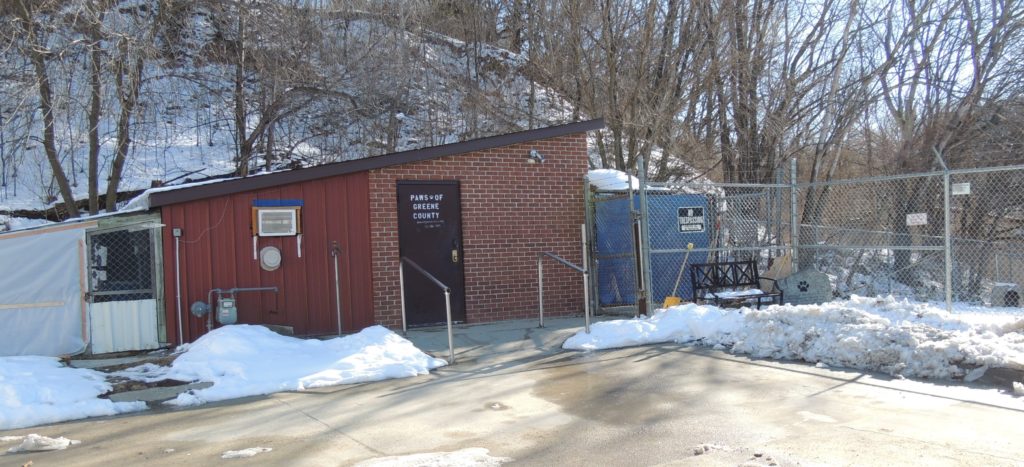The proposed Greene County Animal Shelter may have blown away in the August derecho before it was even built.
The Jefferson city council expected to award a contract for the animal shelter at its meeting Tuesday, after a bid opening Nov. 19. Instead, Don Orris, who has spent the last five years fundraising for the project, shared what he called “super disappointing” news. The lowest of five bids was $1,007,000. He had expected bids to be in the neighborhood of $450-$550,000.
City attorney Boib Schwarzkopf advised the council not to consider awarding a contract because there isn’t enough money for the project.

Orris said he and the architect on the project will analyze why the bids came in so high. He reminded the council there is $634,000 raised to date. Of that, $250-$260,000 is for equipment, architect fees, utility hook-ups, etc. The amount available for the actual building is $375,000.
His estimate for the cost of the building was based on the cost of a similar building, of similar size, built a year ago in Jefferson. That building cost less than $400,000.
Greene County Development Corporation gave the lot for the animal shelter, an unsold, irregularly shaped parcel in the west business park. Recent soil tests showed work would be needed to compact the soil enough to make it useable for building. The architect estimated the work would cost about $25,000. The bids came in at $100-$200,000.
The HVAC system was estimated to cost $40,000. Bids were $200-$280,000.
“We’re going back to the drawing board with the architects on our end, to figure out why the bids were so much higher than we anticipated,” Orris told the council.
He said that getting the excavation and HVAC to more reasonable costs would still leave the project “over budget by quite a bit.”
Orris was told by the local contractor who build the similar-sized building a year ago that since the derecho, “metal building companies are just going wild.” Metal farm buildings across much of the state were damaged or destroyed, and farmers have insurance money to replace them.
“There are all kinds of farmers out there who don’t really care exactly how the building is built, just want a building put up to put some farm equipment in, it’s easier for them (the contractors) to get involved with those projects and build 10 of them, compared to doing something as complicated as an animal shelter. We think, though we don’t know for sure, that’s a major reason (for the high bids.) They’re so doggone busy they can’t possibly catch up,” Orris said.
The architect wants to rebid the project in February or March, hoping the contractors won’t have as many projects lined up by then and bids will come in lower.
Orris said he had people he thought would help make up the difference between money raised and total project cost if the bids came in as expected. “If it’s not going to be in that range, I don’t know what the move forward is,” he said.
“I’ve worked on this so long and so hard, and every single time I turn around, there’s a major roadblock,” Orris said. “This is a huge, major roadblock. I don’t know what to do. If we can’t figure out how to get the price of the building to where we need to be, if there is not somebody to step forward to give a major portion of the money to finish this project, it is going to fail. I don’t know how else to put it…. We have a $600,000 obstacle sitting in our way.”
He said he doesn’t think there are many people who have a large amount of money to give to the project.
He said he has spent time looking for alternative sites that wouldn’t require so much dirt work and are closer to water/sewer lines. It would cost $80,000 to connect water and sewer to the current site. An advantage of the proposed site is that there’s space for a dog park adjacent to the shelter. He said he hasn’t seen other sites large enough.
Orris isn’t quite ready to give up on the new shelter. “If all these things fall in place, if I can see an end game, fine. If I can’t see an end game to this, if there is no solution to raising this kind of money to build this, then I’m obligated to give the money back to the people who tried to raise it in the beginning,” he said.
When the project is rebid this winter, he’ll be looking at a cost less than $550,000. “Any more than that is too much. We’d still need to raise $180,000. That’s do-able. I don’t think it’s possible to raise more than that.”
He said he has spent the last five years asking people for money, and if they intended to give more, they would have by now.
